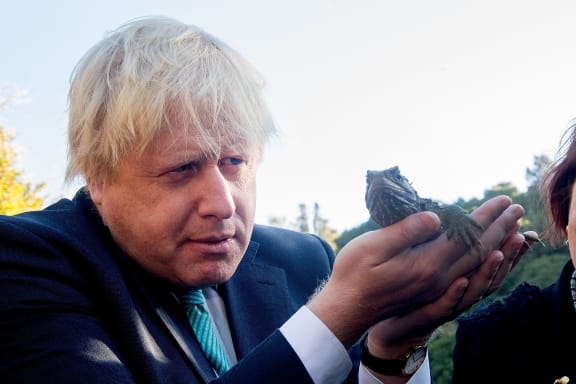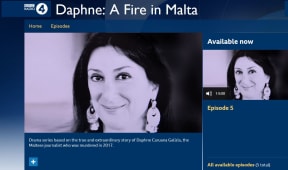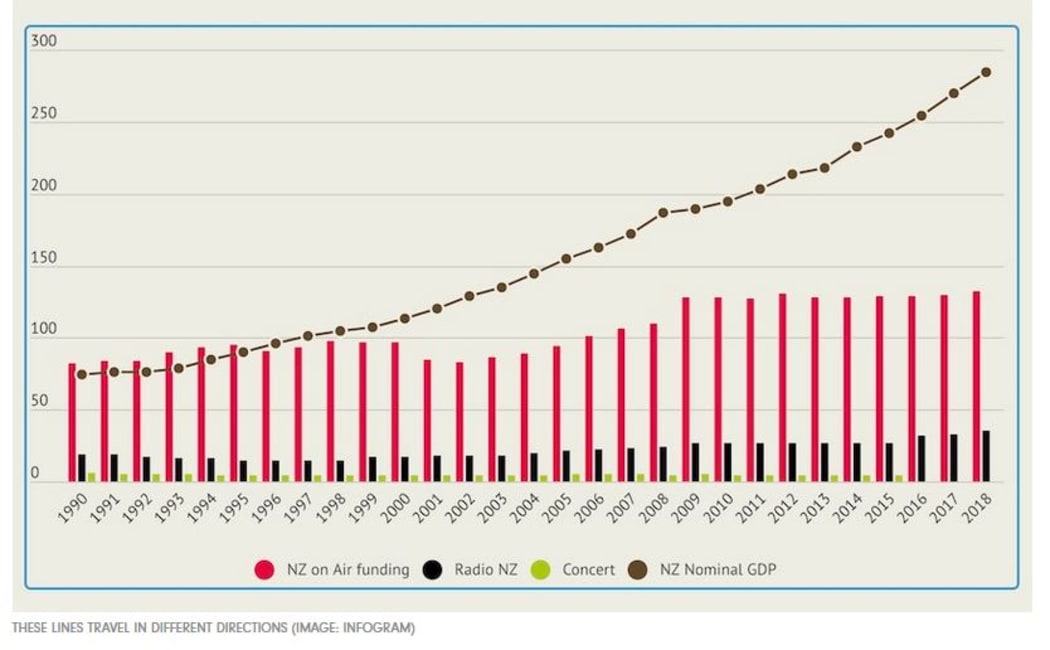This week on Mediawatch Midweek Jeremy Rose talks to Karyn Hay about the new Netflix series The Great Hack; Boris Johnson - a disgraced hack turned UK PM, and; "Ricky Leaks" - a journalistic scoop that's seen hundreds of thousands taking to the streets of Puerto Rico demanding the resignation of governor Ricardo Rossello.
Disgraced hack to British PM
Alexander Boris de Pfeffel Johnson began his working life as a trainee journalist on The Times but it was a short-lived gig - he was sacked for making up a quote and attributing it to his godfather: the academic Colin Lucas.
From there he moved to the Daily Telegraph which posted him to Brussels as its European correspondent in 1989 aged 25.

Boris Johnson inspects a tuatara during his visit to Zealandia wildlife sanctuary. Photo: Pool / Marty Melville
Sonia Purnell the author of Just Boris: A Tale of Blond Ambition wrote in the Guardian this week that in his five years in Brussels he "made his name by almost singlehandedly developing a compelling narrative that everything emanating from the EU was either loony or sinister."
Greatest hits from the period included a no bent bananas allowed in the EU story and a claim that European bureaucrats were insisting on a one size fits all condom. Neither story was based in fact.
He went on to become assistant editor of the Telegraph and a columnist for The Spectator - his column became notorious for the use of words like “piccaninny” and “puffing coolies”.
It was around this time a tape emerged of him agreeing help a convicted fraudster arrange for a journalist to be beaten up.
Spinoff editor Toby Manhire - in an article titled 12 eye-watering facts about the new British prime minister, Boris Johnson quoted the Telegraph's former editor Sir Max Hastings saying: “If the day ever comes that Boris Johnson becomes tenant of Downing Street, I shall be among those packing my bags for a new life in Buenos Aires or suchlike, because it means that Britain has abandoned its last pretensions to be a serious country.”
No word on whether Sir Max has booked his tickets yet.
The Great Hack on Netflix
One of Boris Johnson's toughest challenges will be negotiating Brexit. Many would say that he did more than most to pave the way to the leave victory in the referendum but a Netflix documentary out today: The Great Hack suggests the victory had more to with high-tech dodgy social media manipulation by Cambridge Analytica than campaigning by the like of Britain's new PM.
US media academic David Carroll - who launched a legal campaign to force Cambridge Analytica to reveal its data report on him features in the film as does Observer journalist Carole Cadwalladr - who originally revealed the now bankrupt company's part in Brexit and the election of Donald Trump.

Photo: Netflix: screenshot
"People don't want to admit that propaganda works," Carroll tells a packed audience in the documentary, "because to admit it means confronting our own susceptibilities, horrific lack of privacy and hopeless dependency on tech platforms, ruining our democracy on various attack services."
It's a powerful and disturbing documentary.
Telegram hack threatens to topple Puerto Rico's government
Protests up to half a million strong have become an almost daily event since Puerto Rico's Center for Investigative Journalism published 889 pages of leaked messages between Puerto Rican governor Ricardo Rosselló and government officials the week before last.
The messages were from the end-to-end encrypted app Telegram. Brazil's government is also currently embroiled in a scandal resulting from a massive leak of Telegram messages leaked to The Intercept website.
In neither case is there any suggestion that the app - popular with people concerned with security - has been successfully hacked. In seems the messages have been leaked or possibly malware installed in a phone.

Photo: Telegram: screenshot
"Telegram messages are heavily encrypted and can self-destruct," the website boasts. But in Puerto Rico and Brazil at least the self-destruct function appears to have been turned off.
Executive director of the Center for Investigative Journalism Carla Minet spoke to Democracy Now about the messages and the decision to publish them.
The island's justice department have issued summonses for governor Rossello and 11 others implicated in the scandal. Rossello refusing to resign but won't stand again.
The protests have had a festive air to them with local musicians and others regularly appearing. Afilando los Cuchillos (Sharpening the Knives) by Calle 13 has become something of an anthem.
Meanwhile, on Monday The Intercept published part six of its ongoing series resulting from the Telegram leak in Brazil.
Founding editor Glenn Greenwald and his husband David Miranda - a congressman with the Socialist and Liberty Party - have received death threats.
Murder on Malta
Speaking of brave, crusading journalists, the BBC has a radio doco-drama up on its website about the Maltese investigative journalist Daphne Caruana Galizia.

Photo: BBC screenshot
The BBC blurb for Daphne: A Fire in Malta describes Galizia a Malta’s top investigative reporter and says: "[She] dedicated her life to holding power to account; investigating allegations of organised crime, cronyism and corruption on this tiny island state. On the afternoon of October 16th, 2017, she was driving to the bank to regain control of her account, which had been frozen at the request of a government minister, when she was killed after a bomb exploded under her car. Half a kilo of explosives, hidden under the driver’s seat, were detonated remotely. She was 53 years old."
Public spending: comms versus journalism
There's been a couple of strangely complementary bits of journalism this past week: one looking at the ballooning cost of the government's comms budget - the other at the stagnating public spend on journalism.
An investigation by RNZ journalist Phil Pennington's that aired on Morning Report this morning revealed a 60 percent growth in the number of comms stuff since 2013. Salary costs are up by 45 percent - compared with wage inflation of 14 percent.
Meanwhile, the wage gap between journalists and comms staff continues to grow.
And on the Spinoff executive editor Duncan Grieve published a chart that showed that the New Zealand economy had grown by 281 percent since 1990 when NZ on Air was launched but the funding agency's budget had only grown by 61 percent.

Photo: Spinoff: Screenshot

